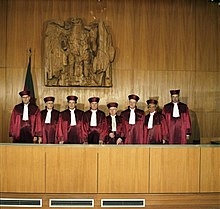Wüppesahl judgment
The “Wüppesahl judgment” of the Federal Constitutional Court (BVerfG) of June 13, 1989 is a fundamental judgment on parliamentary law that is often cited in German law. It deals with the status of the member of the Bundestag and the scope of rights of a non-attached member . The decision had been won by the MP Thomas Wüppesahl .
facts
Thomas Wüppesahl entered the German Bundestag in the 1987 Bundestag election via the Schleswig-Holstein state list of The Greens . He resigned from the party in May 1987 and was expelled from the Greens parliamentary group on January 26, 1988 .
Wüppesahl resisted his dismissal from all committees and, as a non-attached member of parliament, wanted to sit in one of the two front rows of banks in the Bundestag and, like the parliamentary groups, receive a subsidy from the budget , which the Bundestag Presidium rejected. When he requested a debate on these points in the Bundestag and requested corresponding changes to the rules of procedure of the German Bundestag , he was denied speaking time by parliament.
On the other hand, Wüppesahl, as the applicant, led an organ dispute before the Federal Constitutional Court. Defendants were both the German Bundestag and the President of the Bundestag and the green parliamentary group.
Requests
Wüppesahl wanted to continue to have the right to legislative initiatives, the legal right to a committee seat, to simple motions and written minor inquiries and not to lose the legal right to an appropriate right to speak in the plenary session of the Bundestag. Wüppesahl claimed a subsidy from the budget in order to be able to continue to acquire additional work (reports, expert invitations, legal advice, etc.).
negotiation
According to Section 14 (2) BVerfGG, the Second Senate of the Federal Constitutional Court is responsible for organ disputes. The Second Senate consisted of Ernst Gottfried Mahrenholz , Ernstträger , Ernst-Wolfgang Böckenförde , Hans Hugo Klein , Karin Graßhof , Konrad Kruis , Everhardt Franßen and Paul Kirchhof . The hearing was on February 21, 1989. The managing directors of the parliamentary groups and the President of the Federal Audit Office were heard.
decision
The Federal Constitutional Court ruled in the organ dispute proceedings with judgment of June 13, 1989 that the denial of membership in a committee with the right to speak and propose - but without the right to vote - violated the right of the member of Article 38.1 sentence 2 GG . An appropriate right to speak for individual members in the plenary was also established. Furthermore, since this decision, each individual MP has been able to intervene in the legislative process regardless of whether he or she is party to a parliamentary group by introducing amendments in the second reading . Wüppesahl's other applications were rejected. In addition, the Constitutional Court ruled that the parliamentary committees must show the composition of the plenary in a smaller way and that the preparation of decisions and resolutions of the plenary presupposes the development of a majority decision-making basis. It would not be compatible with this if the political weighting within parliament were not reflected in the committees. The ruling strengthened the rights of so-called deviants in German parliaments.
The PDS decision of 1997 clarified the rights of the so-called group in the German Bundestag.
Web links
- "Wüppesahl judgment" ( BVerfGE 80, 188)
Individual evidence
- ↑ BVerfG judgment of June 13, 1989, Az. 2 BvE 1/88, BVerfGE 80, 188 .
- ↑ Group status PDS. Decision of September 17, 1997. AZ 2 BvE 4/95 ( online )


